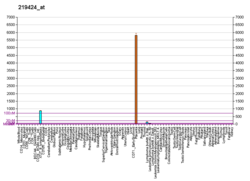EBI3
Epstein-Barr virus induced gene 3, also known as interleukin-27 subunit beta or IL-27B, is a protein which in humans is encoded by the EBI3 gene.[5][6]
Function
[edit]This gene was identified by the induction of its expression in B lymphocytes by Epstein–Barr virus infection. The protein encoded by this gene is a secreted glycoprotein, which is a member of the hematopoietin receptor family related to the p40 subunit of interleukin 12 (IL-12). It plays a role in regulating cell-mediated immune responses.[7]
EBI3 is a subunit in 2 distinct heterodimeric cytokines: interleukin-27 (IL27) and IL35. IL27 is composed of p28 (IL27) and EBI3. IL27 can trigger signaling in T cells, B cells, and myeloid cells.[8] IL35, an inhibitory cytokine involved in regulatory T-cell function, is composed of EBI3 and the p35 subunit of IL12.[7][9]
References
[edit]- ^ a b c GRCh38: Ensembl release 89: ENSG00000105246 – Ensembl, May 2017
- ^ a b c GRCm38: Ensembl release 89: ENSMUSG00000003206 – Ensembl, May 2017
- ^ "Human PubMed Reference:". National Center for Biotechnology Information, U.S. National Library of Medicine.
- ^ "Mouse PubMed Reference:". National Center for Biotechnology Information, U.S. National Library of Medicine.
- ^ "Entrez Gene: EBI3 Epstein-Barr virus induced gene 3".
- ^ Devergne O, Hummel M, Koeppen H, Le Beau MM, Nathanson EC, Kieff E, Birkenbach M (February 1996). "A novel interleukin-12 p40-related protein induced by latent Epstein-Barr virus infection in B lymphocytes". J. Virol. 70 (2): 1143–53. doi:10.1128/JVI.70.2.1143-1153.1996. PMC 189923. PMID 8551575.
- ^ a b Collison LW, Workman CJ, Kuo TT, Boyd K, Wang Y, Vignali KM, Cross R, Sehy D, Blumberg RS, Vignali DA (November 2007). "The inhibitory cytokine IL-35 contributes to regulatory T-cell function". Nature. 450 (7169): 566–9. Bibcode:2007Natur.450..566C. doi:10.1038/nature06306. PMID 18033300. S2CID 4425281.
- ^ Batten M, Li J, Yi S, Kljavin NM, Danilenko DM, Lucas S, Lee J, de Sauvage FJ, Ghilardi N (September 2006). "Interleukin 27 limits autoimmune encephalomyelitis by suppressing the development of interleukin 17-producing T cells". Nat. Immunol. 7 (9): 929–36. doi:10.1038/ni1375. PMID 16906167. S2CID 32503719.
- ^ Niedbala W, Wei XQ, Cai B, Hueber AJ, Leung BP, McInnes IB, Liew FY (November 2007). "IL-35 is a novel cytokine with therapeutic effects against collagen-induced arthritis through the expansion of regulatory T cells and suppression of Th17 cells". Eur. J. Immunol. 37 (11): 3021–9. doi:10.1002/eji.200737810. PMID 17874423.
Further reading
[edit]- Small RD (1976). "Letter: Statistical analysis of respiratory sensitivity to CO2". N. Engl. J. Med. 295 (7): 397. doi:10.1056/NEJM197608122950720. PMID 934235.
- Devergne O, Hummel M, Koeppen H, et al. (1996). "A novel interleukin-12 p40-related protein induced by latent Epstein-Barr virus infection in B lymphocytes". J. Virol. 70 (2): 1143–53. doi:10.1128/JVI.70.2.1143-1153.1996. PMC 189923. PMID 8551575.
- Devergne O, Birkenbach M, Kieff E (1997). "Epstein-Barr virus-induced gene 3 and the p35 subunit of interleukin 12 form a novel heterodimeric hematopoietin". Proc. Natl. Acad. Sci. U.S.A. 94 (22): 12041–6. Bibcode:1997PNAS...9412041D. doi:10.1073/pnas.94.22.12041. PMC 23696. PMID 9342359.
- Pflanz S, Timans JC, Cheung J, et al. (2002). "IL-27, a heterodimeric cytokine composed of EBI3 and p28 protein, induces proliferation of naive CD4(+) T cells". Immunity. 16 (6): 779–90. doi:10.1016/S1074-7613(02)00324-2. PMID 12121660.
- Strausberg RL, Feingold EA, Grouse LH, et al. (2003). "Generation and initial analysis of more than 15,000 full-length human and mouse cDNA sequences". Proc. Natl. Acad. Sci. U.S.A. 99 (26): 16899–903. Bibcode:2002PNAS...9916899M. doi:10.1073/pnas.242603899. PMC 139241. PMID 12477932.
- Larousserie F, Pflanz S, Coulomb-L'Herminé A, et al. (2004). "Expression of IL-27 in human Th1-associated granulomatous diseases". J. Pathol. 202 (2): 164–71. doi:10.1002/path.1508. PMID 14743498. S2CID 25887054.
- Grimwood J, Gordon LA, Olsen A, et al. (2004). "The DNA sequence and biology of human chromosome 19". Nature. 428 (6982): 529–35. Bibcode:2004Natur.428..529G. doi:10.1038/nature02399. PMID 15057824.
- Gehlert T, Devergne O, Niedobitek G (2004). "Epstein-Barr virus (EBV) infection and expression of the interleukin-12 family member EBV-induced gene 3 (EBI3) in chronic inflammatory bowel disease". J. Med. Virol. 73 (3): 432–8. doi:10.1002/jmv.20109. PMID 15170639. S2CID 40275209.
- Colland F, Jacq X, Trouplin V, et al. (2004). "Functional proteomics mapping of a human signaling pathway". Genome Res. 14 (7): 1324–32. doi:10.1101/gr.2334104. PMC 442148. PMID 15231748.
- Gerhard DS, Wagner L, Feingold EA, et al. (2004). "The status, quality, and expansion of the NIH full-length cDNA project: the Mammalian Gene Collection (MGC)". Genome Res. 14 (10B): 2121–7. doi:10.1101/gr.2596504. PMC 528928. PMID 15489334.
- Rual JF, Venkatesan K, Hao T, et al. (2005). "Towards a proteome-scale map of the human protein-protein interaction network". Nature. 437 (7062): 1173–8. Bibcode:2005Natur.437.1173R. doi:10.1038/nature04209. PMID 16189514. S2CID 4427026.
External links
[edit]- EBI3 human gene location in the UCSC Genome Browser.
- EBI3 human gene details in the UCSC Genome Browser.






